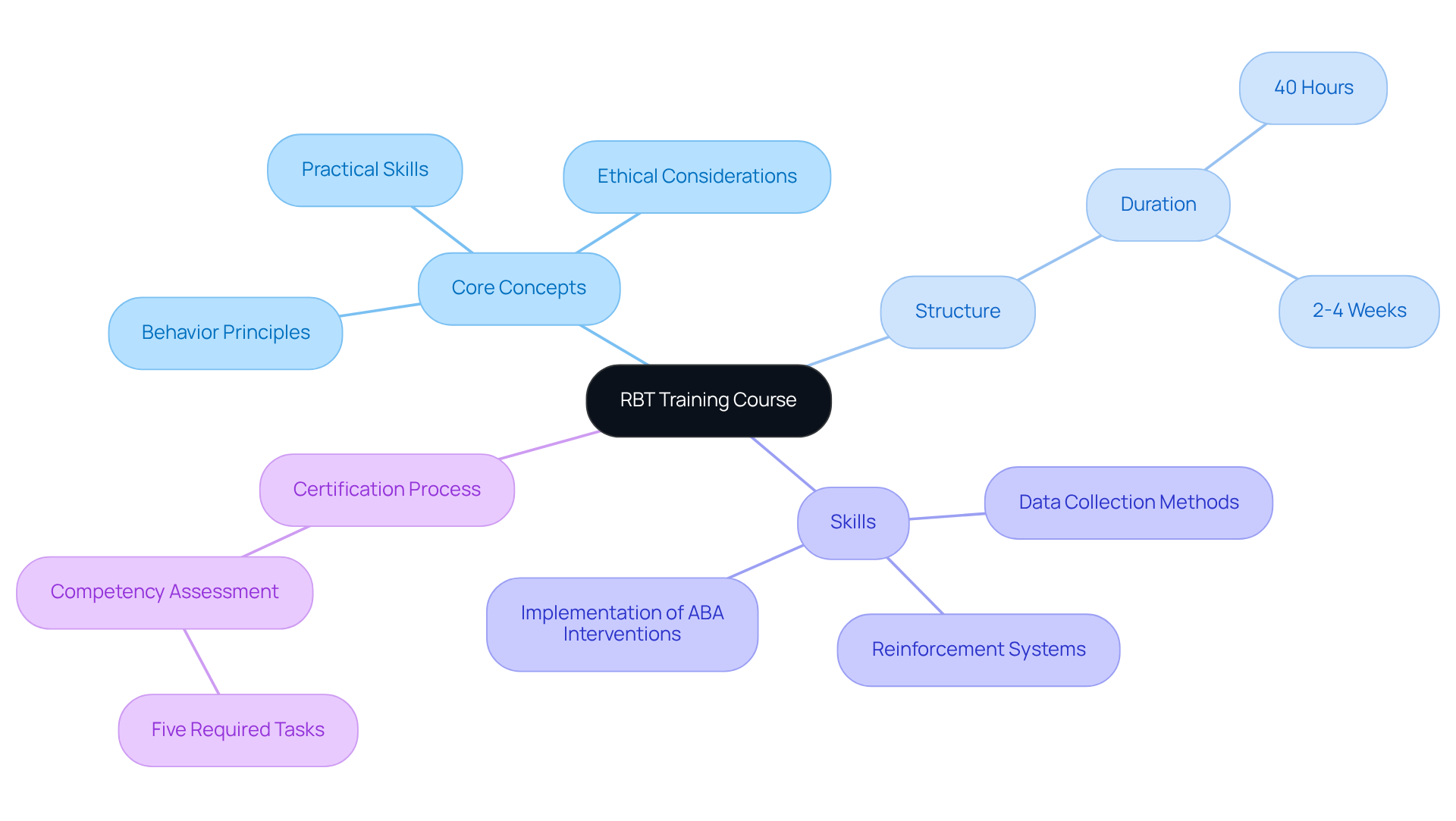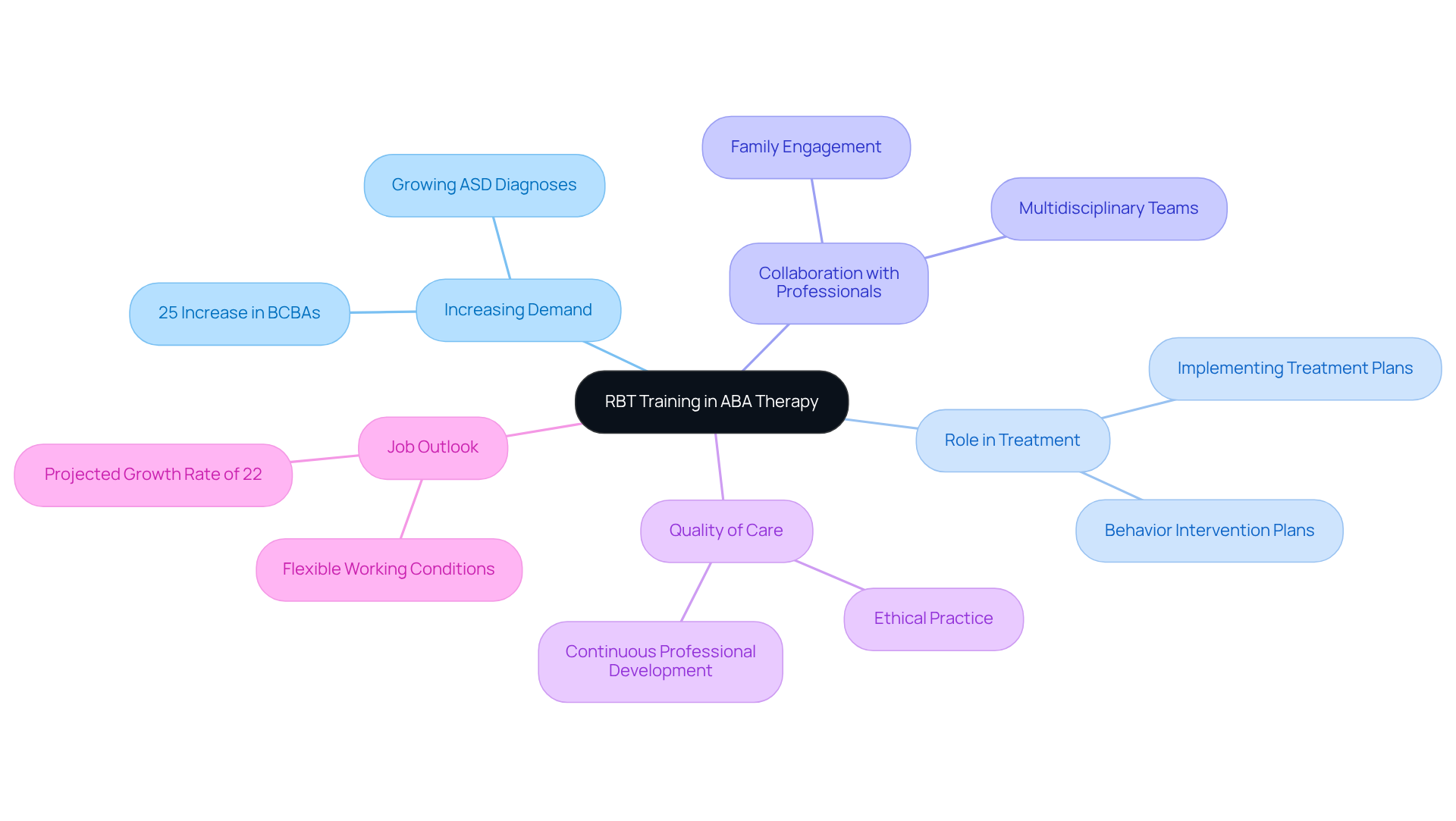September 1, 2025

The RBT training course stands as a pivotal element in preparing individuals to deliver effective Applied Behavior Analysis (ABA) services. With 40 hours of comprehensive instruction covering essential topics such as:
This course equips future Registered Behavior Technicians (RBTs) with the critical skills required to implement treatment plans under supervision. As the demand for qualified professionals in the ABA therapy field escalates—particularly in light of the increasing prevalence of Autism Spectrum Disorder (ASD)—the significance of this training cannot be overstated. It not only addresses the urgent need for skilled practitioners but also ensures that those entering the field are well-prepared to meet the challenges ahead.
The increasing prevalence of Autism Spectrum Disorder (ASD) has resulted in a significant surge in demand for skilled professionals in the field of Applied Behavior Analysis (ABA) therapy. At the core of this demand is the Registered Behavior Technician (RBT) training course, a pivotal program designed to equip individuals with the essential skills necessary to deliver effective ABA services.
As the landscape of behavioral healthcare continues to evolve, one must reflect on a crucial question: what does it truly take to become a competent RBT, and how does this training shape the future of therapy outcomes? Understanding these dynamics is vital for organizations seeking to enhance their therapeutic offerings and improve client outcomes.
The RBT training course is a vital educational program designed to equip individuals with the essential skills and knowledge necessary for effective Applied Behavior Analysis (ABA) services. Typically comprising 40 hours of instruction, which can be completed in 2-4 weeks, this RBT training course covers critical topics such as:
This structured education incorporates the RBT training course, integrating both theoretical knowledge and hands-on experience to ensure participants are thoroughly prepared to work under the supervision of a Board Certified Behavior Analyst (BCBA). The importance of this preparation is paramount, as the RBT training course lays the groundwork for future behavior technicians to deliver compassionate and effective care in the realm of ABA therapy.
As noted by ABA Building Blocks LLC, 'The RBT training course lays the groundwork for compassionate and effective care in the field of applied behavior analysis.' Mastering core concepts such as reinforcement, punishment, and ethical practices in the RBT training course is essential for RBTs, enabling them to make significant contributions to client well-being and team success.
Furthermore, candidates must complete the RBT training course and pass a competency assessment consisting of five tasks to achieve certification, underscoring the rigor of the preparation process. With an , investing in RBT education proves advantageous not only for the professionals themselves but also for healthcare employers seeking to enhance their teams.

The RBT training course is essential in the realm of ABA therapy, particularly as the demand for qualified professionals surges. With the increase in Autism Spectrum Disorder (ASD) diagnoses, the need for skilled Registered Behavior Technicians (RBTs) has reached unprecedented levels. These technicians play a crucial role in implementing treatment plans designed by Board Certified Behavior Analysts (BCBAs), significantly impacting the quality of care clients receive. As the ABA therapy market continues to grow, with demand for BCBAs projected to increase by 25% over the next five years, RBTs will increasingly contribute to this expanding field. They often collaborate with multidisciplinary teams, including speech therapists and educators, to provide comprehensive support tailored to individual needs. This teamwork not only enhances client outcomes but also fosters a holistic approach to therapy, opening doors to new opportunities and potentially higher salaries in the field.
Moreover, the RBT training course is crucial for maintaining high standards of practice within ABA therapy. By equipping behavior technicians with the necessary skills and knowledge through an RBT training course, the industry can ensure that interventions are both ethical and respectful of clients' dignity. The dedication to continuous professional growth further enhances the quality of care, as registered behavior technicians remain informed about best practices and advancements in autism treatment. With the staying favorable and anticipated growth rates between 12% to 22% over the next decade, investing in strong development programs is essential for addressing the rising demand for effective ABA services and for individuals seeking to progress their careers in this flourishing market. Additionally, the flexibility in working conditions available in this field enhances the appeal of pursuing a career as an RBT.

To obtain certification as a Registered Technician (RBT), candidates must complete a mandatory 40-hour course that adheres to the guidelines established by the Behavior Analyst Certification Board (BACB). This program covers essential topics such as:
This ensures a comprehensive foundation in Applied Behavior Analysis (ABA).
Crafted by two doctoral BCBAs, the development program enhances the credibility of the certification process. Applicants are required to finish the program within a timeframe of at least 5 days and no more than 180 days. Upon completion of the training, candidates must pass a administered by a Board Certified Behavior Analyst (BCBA), which evaluates their practical skills in real-world scenarios.
Moreover, candidates are expected to have a minimum of two in-person meetings with their supervisor each month throughout their training. Following this, candidates must successfully pass the RBT certification exam, which comprises 85 multiple-choice questions—75 scored and 10 pilot questions—to obtain their credential. Notably, the national average pass rate for first-time RBT exam takers is typically below 80%, underscoring the necessity for thorough preparation.
The application fee to the BACB is $50, while the exam fee is $45, making the overall cost of becoming an RBT relatively low. These stringent requirements are designed to ensure that RBTs possess the requisite knowledge and skills to deliver effective ABA services under supervision, thereby upholding the integrity and professionalism of the field.

The rbt training course is available in various formats, including in-person, online, and hybrid models, catering to diverse learning preferences. The surge in popularity of online courses can be attributed to their flexibility, allowing participants to complete the required 40 hours at their own pace, typically within 2-4 weeks. This format is particularly advantageous for those balancing other commitments. In contrast, in-person instruction offers valuable hands-on experience and direct interaction with educators, enhancing understanding and retention of material.
Hybrid courses combine the best of both worlds, integrating online learning with in-person workshops to reinforce skills and concepts. This approach accommodates different learning styles and fosters a collaborative environment where participants can engage with peers and instructors. Various providers, including universities, colleges, and specialized organizations, offer an RBT training course, each presenting unique features and pricing structures. Some programs may include additional support through AI tutors or live feedback sessions, further enhancing the learning experience.
The demand for Registered Behavior Technicians (RBTs) is rapidly increasing, driven by heightened awareness of autism and developmental disorders. RBT roles rank among the fastest-growing positions in behavioral healthcare, with an estimated 23% job growth projected over the next decade. Consequently, organizations are actively seeking effective educational solutions to prepare qualified candidates. With ranging from $35,000 to over $50,000, depending on location and experience, the appeal of RBT roles continues to grow. It is essential for aspiring professionals to find a training program that aligns with their career goals. Additionally, RBTs are required to complete 20 Continuing Education Units (CEUs) every two years, ensuring ongoing professional development and competency in their roles.

The RBT training course stands as a pivotal foundation for individuals eager to enter the realm of Applied Behavior Analysis (ABA). With a comprehensive curriculum that merges theoretical knowledge with practical skills, this program prepares future Registered Behavior Technicians (RBTs) to provide effective and compassionate care. The structured approach guarantees that participants are not only well-informed but also ready to implement interventions under the supervision of certified professionals.
Key elements of the RBT training course are highlighted throughout the article, encompassing its core components, certification prerequisites, and the diverse training formats available. The significance of this program is amplified by the rising demand for qualified technicians in the ABA sector, a trend propelled by an increase in Autism Spectrum Disorder diagnoses and a burgeoning job market. The rigorous training process, featuring hands-on experience and competency assessments, ensures that RBTs are thoroughly equipped to positively influence client outcomes.
As the landscape of ABA therapy evolves, the necessity of investing in quality RBT training becomes increasingly apparent. For aspiring professionals, selecting the right training program is crucial—not only to enhance their skill set but also to uphold the highest standards of care for clients. In a field that profoundly affects the lives of many, pursuing RBT certification signifies a commitment to professional excellence and a rewarding career in behavioral health.
What is the RBT training course?
The RBT training course is an educational program designed to equip individuals with the essential skills and knowledge necessary for effective Applied Behavior Analysis (ABA) services.
How long does the RBT training course typically take to complete?
The RBT training course typically comprises 40 hours of instruction, which can be completed in 2-4 weeks.
What topics are covered in the RBT training course?
The course covers critical topics such as behavior principles, ethical considerations, and practical skills required for implementing ABA interventions.
What is the structure of the RBT training course?
The RBT training course integrates both theoretical knowledge and hands-on experience to prepare participants to work under the supervision of a Board Certified Behavior Analyst (BCBA).
Why is the RBT training course important?
The RBT training course lays the groundwork for future behavior technicians to deliver compassionate and effective care in ABA therapy, ensuring they master core concepts essential for client well-being and team success.
What is required to achieve RBT certification?
Candidates must complete the RBT training course and pass a competency assessment consisting of five tasks to achieve certification.
What is the average wage for RBTs?
The average wage for RBTs is approximately $24 per hour.
How does investing in RBT education benefit professionals and healthcare employers?
Investing in RBT education proves advantageous for professionals by enhancing their skills and job prospects, while also benefiting healthcare employers looking to enhance their teams.
Our expert recruitment strategies and AI-driven sourcing ensure that you receive top-notch candidates quickly, without compromising on quality. Whether you’re looking for BCBAs, Clinical Directors, or RBTs, we’ve got you covered.